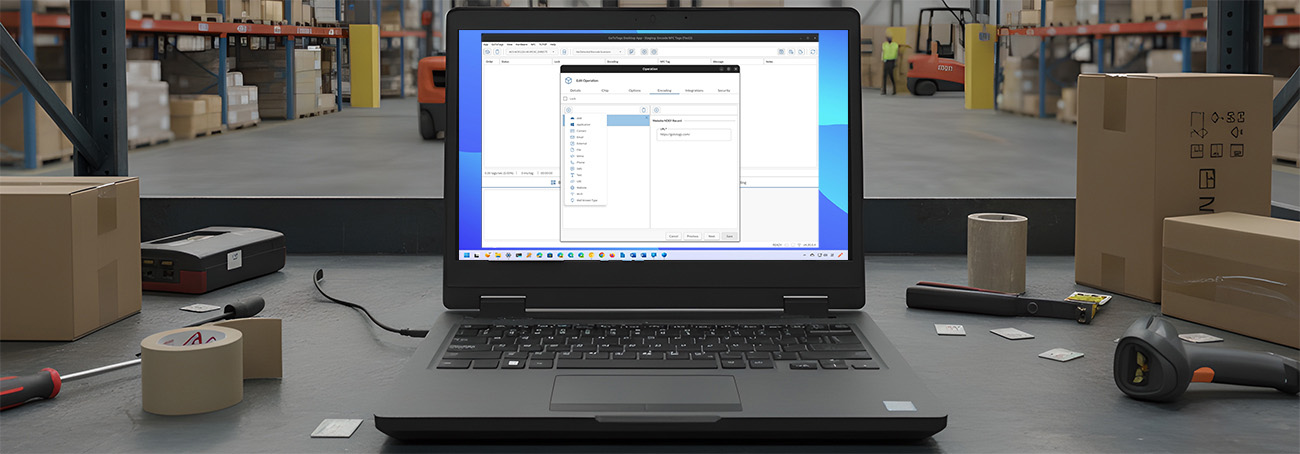GoToTags Desktop App v4.30.0 Introduces Two Specialized NFC Encoding Operations
The GoToTags Desktop App v4.30.0 now features redesigned Near Field Communication (NFC) encoding operations, splitting functionality into two distinct workflows optimized for different encoding scenarios. Released on October 31, 2025, this update also adds support for the ACS ACR1555U NFC reader and ST25DV64K chip types, expanding hardware compatibility for users.
Different Encoding Scenarios Require Different Workflows
Developers and manufacturers working with NFC tags face varying encoding requirements depending on their use cases. Some projects require encoding tags with predefined variable data where each tag contains unique information from a prepared dataset. Other projects involve encoding large quantities of tags with identical or dynamically generated content, such as URLs that incorporate tag-specific identifiers or barcode data. Previously, the single Encode NFC Tags operation attempted to serve both scenarios, creating unnecessary complexity for bulk encoding tasks and limiting flexibility for dynamic data replacement. Organizations encoding tags at scale need efficient workflows without the overhead of preparing encoding files when the data can be generated dynamically. The lack of built-in dynamic data replacement meant users had to pre-generate all unique values rather than leveraging real-time data from tag properties or external sources like barcodes.
Two Specialized Encoding Operations
Version 4.30.0 introduces two distinct encoding operations designed for specific workflows. The new Variable Encode NFC Tags operation replaces the previous Encode NFC Tags functionality and handles projects requiring predefined variable data and correlation capabilities. This operation maintains support for encoding tags from prepared datasets and includes correlation ID queueing, allowing users to scan multiple items before encoding corresponding tags.
The redesigned Encode NFC Tags operation now focuses exclusively on bulk encoding scenarios. This operation no longer uses encoding files and instead stores data definitions directly in the operation file. Users do not need to specify tag quantities in advance, providing flexibility for production runs of varying sizes. The operation supports dynamic data replacement through template variables such as {{ target.uid }} for tag identifiers or {{ barcode.data }} for barcode content. This functionality enables real-time data integration during the encoding process.
The redesigned Encode NFC Tags operation now focuses exclusively on bulk encoding scenarios. This operation no longer uses encoding files and instead stores data definitions directly in the operation file. Users do not need to specify tag quantities in advance, providing flexibility for production runs of varying sizes. The operation supports dynamic data replacement through template variables such as {{ target.uid }} for tag identifiers or {{ barcode.data }} for barcode content. This functionality enables real-time data integration during the encoding process.
For example, organizations encoding product tags where barcodes contain matching URLs can create a URL record with {{ barcode.data }} as the value. When a tag is scanned alongside its barcode, the app automatically replaces the template with the barcode content, eliminating the need for pre-generated encoding files. This approach significantly reduces preparation time for large-scale encoding projects while maintaining accuracy through direct data capture.
Choosing Between Variable and Bulk Encoding
Selecting the appropriate operation depends on the data source and project structure. Choose Variable Encode NFC Tags when working with predefined variable data, where each tag’s content is predetermined in a dataset, or when correlation between physical identifiers and tags is required. This operation suits inventory systems, asset tracking implementations, and serialized product authentication, where unique identifiers are pre-assigned. Choose Encode NFC Tags for bulk encoding scenarios where all tags receive identical content or when data can be dynamically replaced during encoding. This operation works well for promotional campaigns, product labeling with barcode integration, and any application where tag-specific data like unique identifiers can be generated at encoding time rather than being predetermined.
Get Started with Desktop App v4.30.0
The GoToTags Desktop App is available for free download and includes these new encoding workflows optimized for different project types. Whether you need predefined variable data encoding or bulk encoding with dynamic data replacement, the app provides the appropriate workflow for efficient tag programming. Download the latest version today to access these new capabilities. If you need assistance with operation selection or setup, the GoToTags team is available to help with any questions.

